Safe pest control for your home
The average home has more than 100 different species of flies, spiders, beetles, ants, termites, and other bugs living within the walls. Insects and rodents can contaminate food, damage homes, and make asthma and allergies worse. The chemicals used to get rid of pests can also cause health problems. Pesticides can cling to carpets, furniture, and other surfaces in your home and are dangerous to people and pets if not properly used.
Here are a few reasons why you would want to get rid of these insects and protect your property, family, and pets:
- Some ant species are known to bite painfully and can spread harmful bacteria after traveling in unsanitary areas
- Cockroaches spread multiple types of illnesses and those that cause food poisoning such as Salmonellosis
- Rats also spread infectious diseases that cause food poisoning and Leptospirosis
- Bedbugs hidden in your furniture can cause itchy bites and skin rash
Biting pests are the ones you have to worry about most. These bugs are dangerous to humans and children alike because they’ll look to you as a food source or as something to attack if threatened.
The best way to control pests is to make your home unappealing to them. Try to locate the source of where/why the pests are coming in and eliminate the root problem. Just like us, pests need water, food, and shelter to survive, and if they can’t find these in your home, it’s likely they’ll go elsewhere.
Try to prevent pests from coming first by:
- Cleaning any crumbs and spillages of food and water
- Remove any grease from counters and wipe down your sink and counters of any excess water
- Wash dirty dishes and seal away any leftover food into containers
- Check around sinks and drains for leaks and contact a specialist if you need any large leaks in piping to be professionally sealed
- Remove and food and water sources
- Regularly throw out the trash and cover it with a lid
- Don’t leave pet food out on the floor
- Keep organic fertilizers in plastic sealed containers
- Close off places where pests can enter and hide. For example, caulk cracks and crevices around cabinets or baseboards. Use steel wool to fill spaces around pipes. Cover any holes with wire mesh.
- Check for pests in packages or boxes before carrying them into your home.

Try home remedies
Home pest control methods should be safe as well as effective. You need to buy and use products made of non-synthetic ingredients including natural oils, naturally occurring compounds, and other non-toxic ingredients to get rid of bugs. It also requires a certain amount of vigilance. Keep an eye out for problems and don’t ignore conditions that could attract pests.
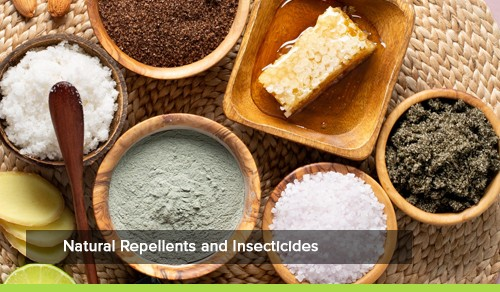
Natural Repellents and Insecticides
- Baking soda and powdered sugar mixed in equal parts is a good roach killer. Just spread around the area where you see roaches and wait for them to disappear.
- In amounts less than a teaspoon, Boric Acid is about as toxic to humans as table salt (Boric acid should NEVER be consumed). But it’s an effective killer of roaches and other insects that groom themselves and ingest the acid.
- Vinegar is a great herbicide. Fill a spray bottle with vinegar — white is best since it won’t stain, you certainly don’t want to use expensive, aged Balsamic vinegar on weeds — and spray the vinegar on your unwelcome flora on your porch, patio or back yard.
- Garlic, a natural insecticide for everything from mosquitoes to Colorado potato beetles, makes an effective barrier for your home. Grind it up with water and apply where ever insects might enter. Garlic-based products, safe to use in kitchens as well as in the vegetable garden, are more concentrated than home preparations, yet over time carry a less detectable odor.
- Certain plants, grown around the periphery of your home, can also serve as barriers. They not only look nice but will also deter pests. Plants known to repel ants and aphids include spearmint, peppermint, and pennyroyal.
- Flies hate the smell of basil. To discourage them, place pots of basil at doorways and windowsills and on the kitchen counter. Don’t have enough sun for potted basil? Put dried basil in a small muslin pouch, rubbing it occasionally to keep the scent strong.
- Some insects like cockroaches and spiders are not fond of citrus. In a spray bottle, mix water and unsweetened lemon or lime juice. Wipe your countertops with the mixture or spray down doorways and windowsills.
- Trap fruit flies with this simple approach: Fill a glass three-quarters full with vinegar or cider vinegar, then add six to eight drops of dishwashing liquid, and fill to the top with warm water. Gruesomely effective.
- Alternately salting and vacuuming your floors will kill flea eggs. But since fleas have a three-day reproduction cycle, you have to be diligent: Salt every day for nine days and vacuum every third day.
- Citronella candles can be burnt inside the house, allowing smoke to waft around and deter flying insects.
- Eucalyptus Oil can be dabbed on cloth strips or cotton balls. It can be left on windowsills, countertops, and along your baseboards to repel pests naturally.
- Trap rodents the old-fashioned way with wooden traps.
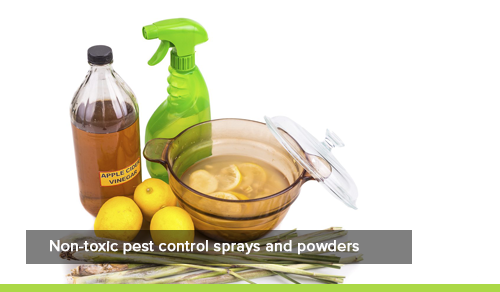
Non-toxic pest control sprays and powders
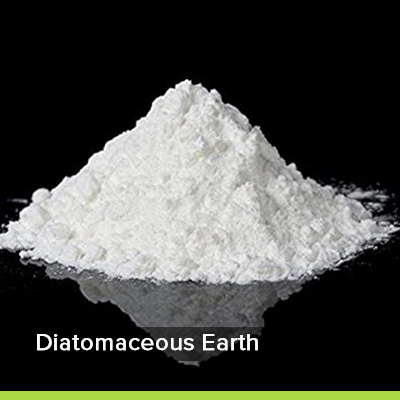
Diatomaceous Earth
This fine powder, made from fossilized algae, is the ultimate non-toxic pest management solution. It can be sprinkled on windowsills, carpets, furniture, and even directly on pests.
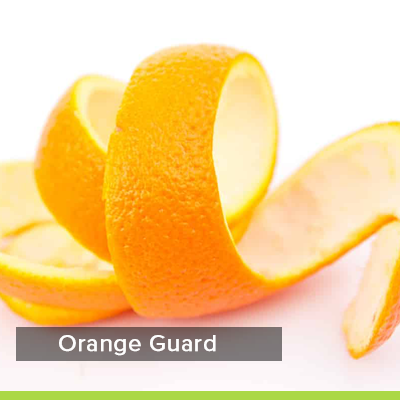
Orange Guard
Orange Guard is made from orange peels. This liquid solution spray is great for the pantry, on countertops, windowsills, and even pet bedding.
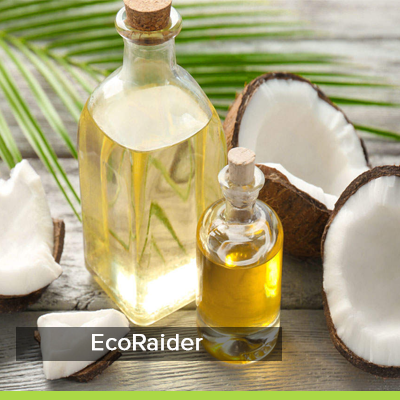
EcoRaider
EcoRaider offers a large variety of products for pests ranging from bed bugs to cockroaches and ants. Their Roach Killer and Repellant is made from geraniol, cedar extract, and sodium lauryl sulfate, which can be derived from coconut or palm oils.
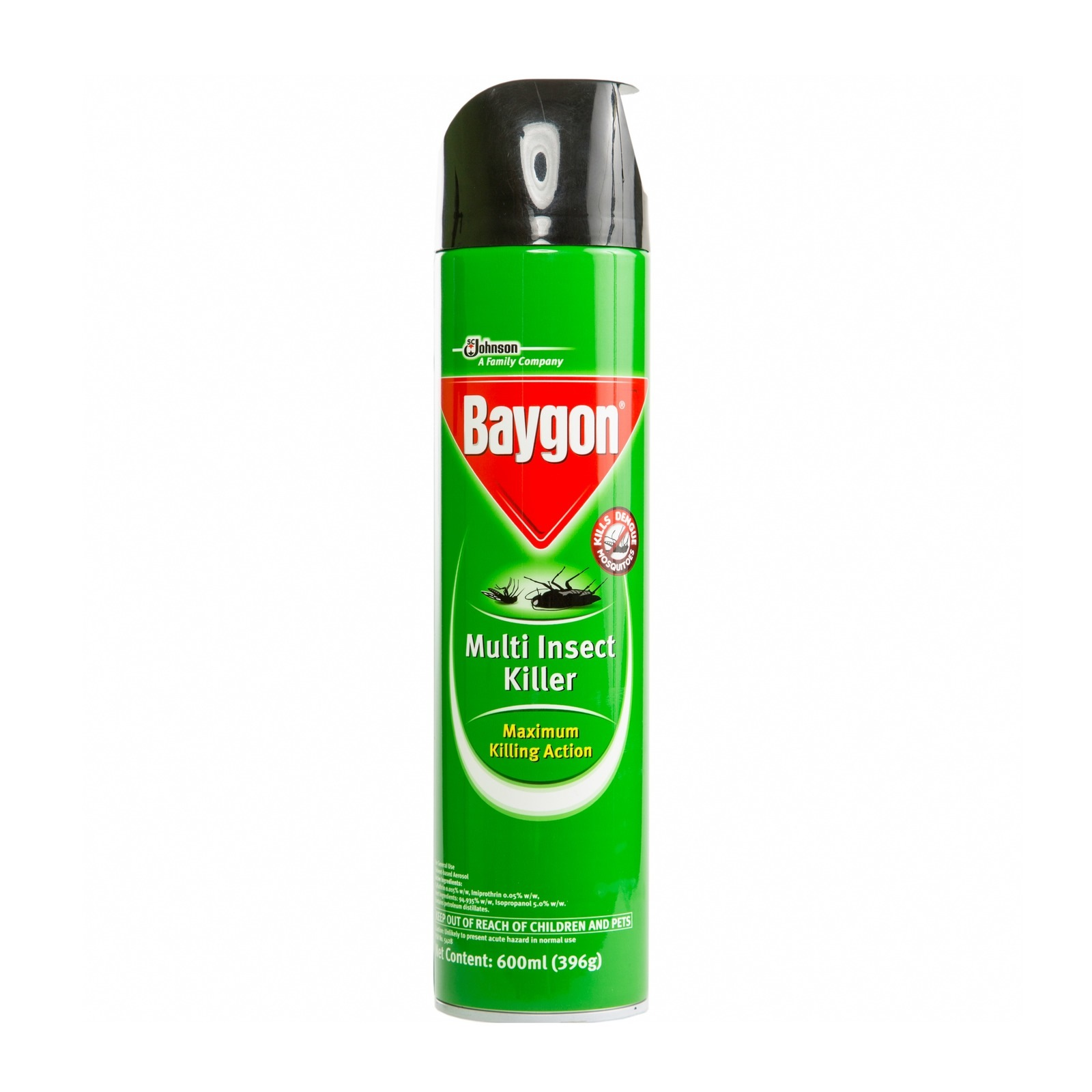
Insect Spray
Many products on the market will help control insects such as mosquitos, cockroaches, ants, ticks, and spiders. These sprays cover a range of bugs that can be a nuisance, and a shot of one of these products will give you quick results.
DIY pest control solutions can be an environmentally friendly and safe way to remove unwanted pests from your property.
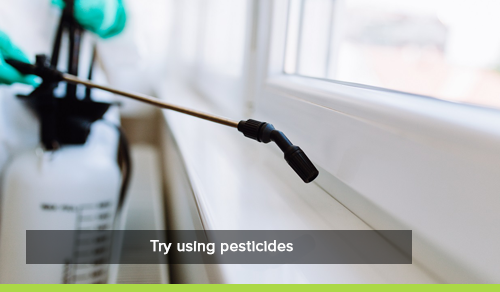
Try using pesticides
If you’ve already tried prevention techniques and you still have a pest problem, you may need to use some kind of pesticide to treat the area. But first, be sure that you know what kind of pest you’re trying to eliminate. If you’re unsure of what pest you’re dealing with, it might be best to call a pest control expert to help identify as knowing what type of pest you’re dealing with will help you choose the right kind of pesticide for your problem. If you misidentify a species, there is a chance your chemicals will not work, or perhaps the pest will grow resistant to said chemical.
Be careful when using pesticides as they are harmful to your health and especially hazardous to pets and children, who spend more time closer to the ground where these chemicals are often applied. Kids are also less resilient to these toxic chemicals than adults, and their developing brains are more susceptible to neurological problems and learning disabilities caused by exposure. Use pesticides with the lowest toxicity—those labeled IV on a scale of I to IV).
Using a bait trap allows you to confine the insecticide to a small area, rather than spreading it around. However, you’ll still need to take care that kids and pets can’t get into the bait traps. Tamper-proof bait traps are available and lower the risk of accidental exposure to the pesticide. You can buy bait traps made specifically for most household pests.
Feel free to ask the pest control company if you require any additional safety info such as material safety data sheets of the products being used. pest control techs are experts in the products they use, and will be glad to explain anything that is confusing to you.
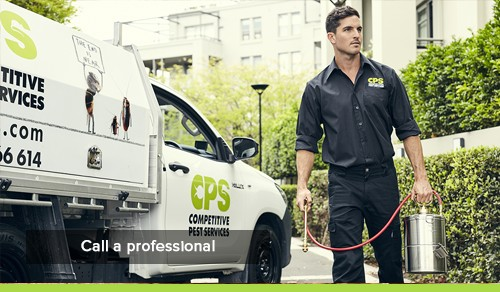
Call a professional pest control company
If the problem is already too big or you don’t have the time or energy to act right away, call a professional. When you make the call, but sure to ask about their non-toxic options. There is an increasing number of pest control companies that are specialists in minimizing dependence on chemical pesticides to rid your home of pest problems.
Pest controllers have a range of products available on the market today that can achieve the same or very similar results. One method may be more suitable than another for your family’s unique concerns.
Contact us to help you get rid of your pest problems today. We use both chemical and eco-friendly products for pest control and will provide you with the best services.

WE'RE NOT HAPPY UNLESS YOU'RE HAPPY
SEE HOW IT WORKSWith Competitive Pest Control Services you’ll never have to worry about paying for a job that hasn’t been done.
If you’re not satisfied with our services, we’ll not only give you your money back, we’ll return it to you twofold. That’s right: you’ll not only receive a full refund, we’ll also pay to have your pest problem sorted by our competition.*
We’re always trying to raise the standard of service, it’s one of the reasons we were name Australian Pest Manager of the Year four times in the past six years. When you employ our services, you know your pest problem will soon be a distant memory. What could be more satisfying than that?
*Please contact us to hear more about our 200% Money Back Guarantee - as due to issues sometimes outside our control, not all services may be covered by this offer.




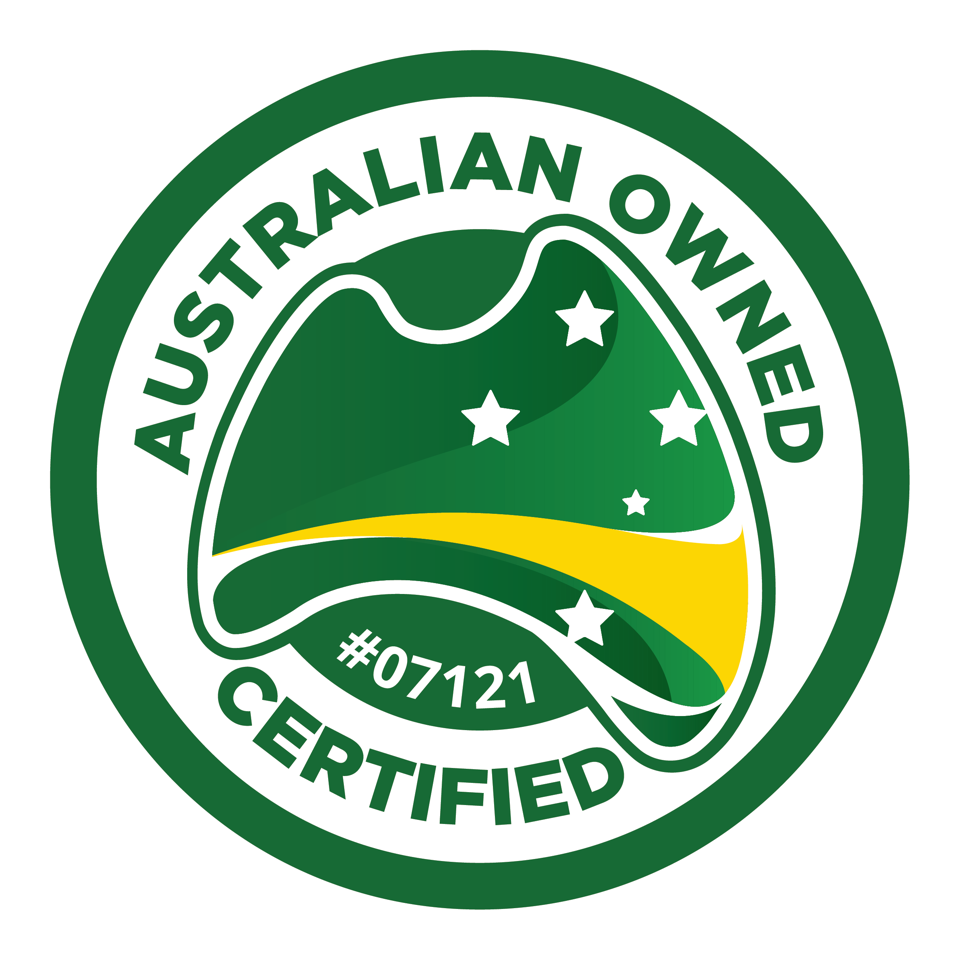
 Instagram
Instagram  LinkedIn
LinkedIn